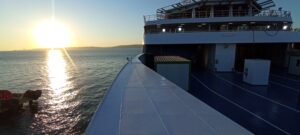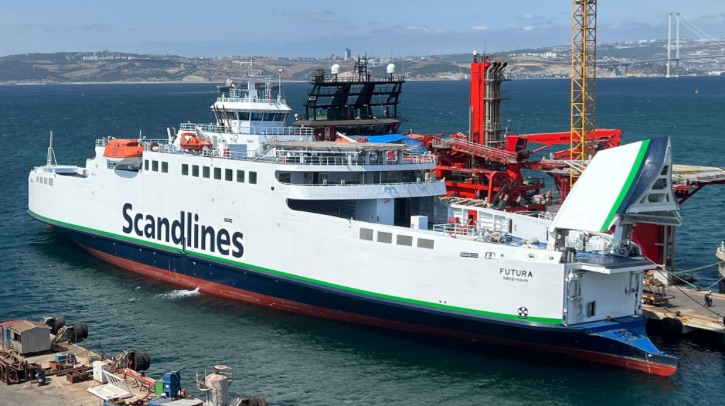The new €80m (US$94m) hybrid-electric ferry has completed its second sea trial in the Sea of Marmara near Turkey and is preparing for its journey to the Fehmarnbelt.
In collaboration with the Cemre shipyard and under the supervision of Lloyd’s Register, the Scandlines ship has been intensively tested under realistic conditions, from blackout simulations to advanced navigation systems and automated safety tests. The official naming and inauguration will take place upon arrival at the Fehmarnbelt later in 2025.
Freight ferry specs
The ferry has a length of 147.4m, a breadth of 25.4m, a design draft of 5.30m and a freight capacity of 66 freight units (approximately 1,200 lane meters). It will be able to carry a maximum of 140 passengers at its service speed of 16/10kts. This will enable the ferry service to complete the crossing in 45 minutes (as of autumn 2025). 
Charging in minutes
When the ferry arrives to the Fehmarnbelt later in 2025, it will be able to charge in 17 minutes in Rødbyhavn, Denmark, due to to Scandlines’ investment in a 50kV/25MW power cable and a transformer station. An intelligent charging tower ensures that the ferry is automatically switched on, regardless of water levels and movements, in under 15 seconds.
A complete charging system has also been installed in Puttgarden, Germany, so that from the end of this year, the ferry will be able to charge in 12 minutes and operate emission-free in both directions with a crossing time of 45 minutes. The vessel also has the option of hybrid operation and is equipped with three diesel generators to ensure flexibility and reliability during the delivery voyage from Turkey.
Rasmus Nielsen, vice president of fleet and administration at Scandlines, said, “With our new zero direct emissions ferry, we are taking another big step toward a greener future for ferry transport. We combine sustainable technology with high capacity and efficient operations – for the benefit of both the environment and our customers.”
In related news, the German Ministry of Transport recently awarded the project financial support as part of a funding program, aimed at promoting the sustainable modernization of coastal vessels to reduce emissions. Read the full story here



